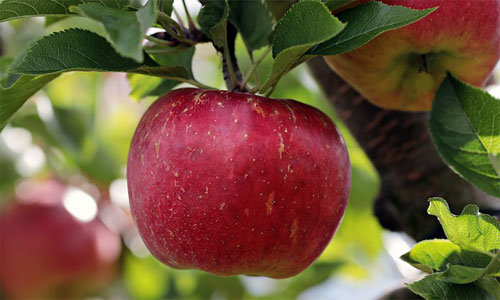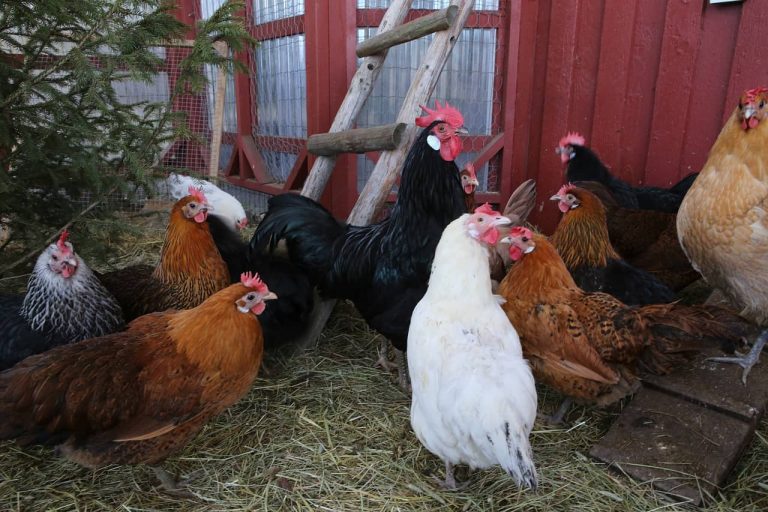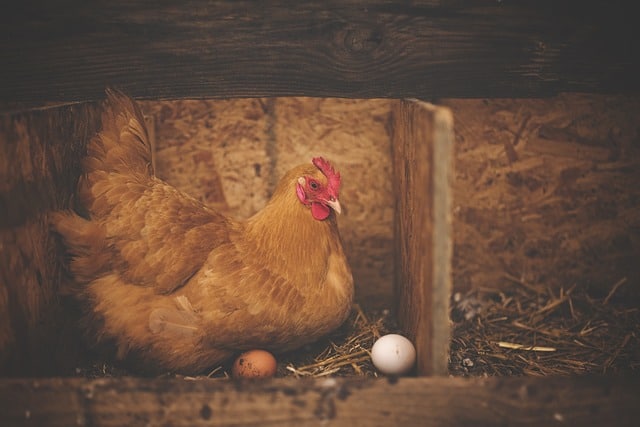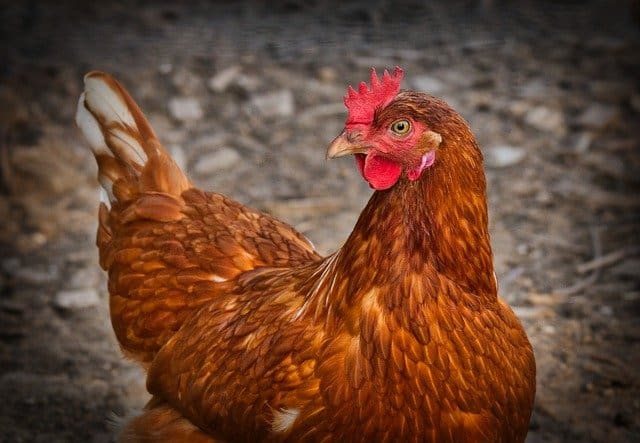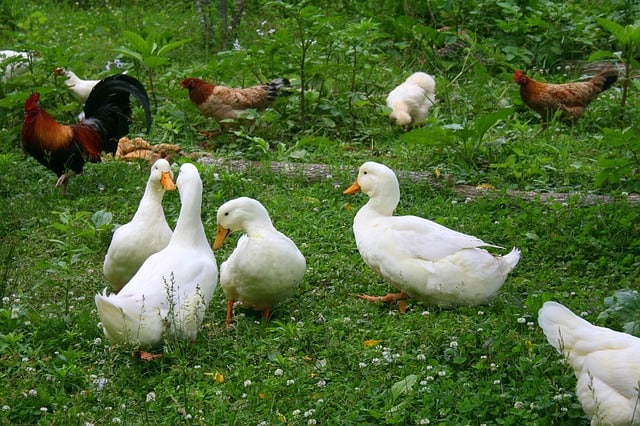As a backyard chicken keeper, if you happen to have a pecan tree in your compound, you might have noticed the feathered friends pecking at the nuts and eating them. The obvious concern would be whether chickens can eat pecans.
In case you haven’t noticed it, chickens are opportunistic feeders. They will eat almost anything. It then becomes our responsibility as caretakers to ensure they are eating the right kinds of food in the right amounts.
In this post, we shall look at the nutritional content of pecans, their health benefits, and any potential adverse effects associated with feeding your chicken with nuts. After all, healthy chickens make happy companions.
Contents
The Nutritional Content of Pecans
Pecans are known for their high content of healthy unsaturated fats, particularly monounsaturated fats, which can help promote heart health. They also provide a good source of dietary fiber, which aids in digestion and helps maintain bowel regularity.
In addition, pecans are rich in minerals such as magnesium, which plays a crucial role in various bodily functions, including nerve function and bone health. They also contain potassium, which is essential for maintaining proper fluid balance and supporting heart health.
Pecans are a good source of vitamin E, an antioxidant that helps protect cells from damage caused by free radicals. They also provide small amounts of other vitamins, like vitamin K and folate.
Specifically, 100 grams of pecan nuts have a caloric content of 691 kcal, a protein content of 9.71 grams, and 71.97 grams of fat. A breakdown of different units of carbohydrates, proteins, and fats is beyond the context of this post.
It’s important to note that the nutritional content of pecans may vary slightly depending on factors such as the specific variety, growing conditions, and preparation methods.
What’s The Edible Part of pecans?
The edible part of pecan is the nut kernel found inside the hard shell. The pecan nut is oval-shaped and has a light brown color. It is covered by a thin, papery brown skin that is typically removed before consumption. The nut kernel is the part that is commonly eaten and used in various culinary applications.
To access the edible kernel, you will need to crack open the hard shell of the pecan. Pecans have a relatively thick shell, and there are various methods and tools available to crack them open. Once cracked, the shell can be removed to reveal the edible nut kernel inside.
Pecan kernels have a rich, buttery flavor and a slightly sweet taste. They can be eaten raw, roasted, or used as an ingredient in a wide range of recipes, including baked goods, salads, trail mixes, and desserts. Pecans are also commonly used in pecan pies, where they are combined with other ingredients to create a delicious and iconic dessert.
It’s worth noting that while the nut kernel is the primary edible part of the pecan, the outer husk or shell that surrounds the nut is not typically consumed. The husk is usually removed and discarded before cracking open the shell to access the nut kernel.
Can chickens Eat the Pecan Shell?
If you have a pecan tree in your backyard, you will notice the chicken pecking on nuts still in their shells. You might be wondering whether the shell is safe. Well, the answer is yes and no, depending on how you view it.
When you see chickens pecking at pecans still in their shells, they may know the nut housed within and attempt to break it and gain access. Sometimes, they just do that as an exercise to clean or sharpen their beaks. In this case, it is completely safe.
However, it would be wrong for you to specifically feed your flock pecan shells. Pecan shells are quite tough and fibrous, and chickens may have difficulty digesting them properly. The shells can potentially cause digestive issues or even pose a choking hazard to chickens.
It’s important to provide chickens with a balanced and appropriate diet that consists of specially formulated chicken feed, grains, vegetables, and occasional treats that are safe for them to consume.
If you have pecans or pecan shells that you want to dispose of, it is best to discard them in a compost pile or other appropriate waste disposal method rather than feeding them to your chickens.
How To Serve Pecans to Your Chickens
If you want to serve pecans to your chickens as an occasional treat, it’s important to do so in a safe and appropriate manner. Here are some guidelines for serving pecans to chickens:
Moderation
Pecans should only be given as an occasional treat and should not make up a significant portion of the chickens’ diet. Treats should generally make up no more than 10% of their total daily food intake.
Cracked pecans
To make pecans easier for chickens to consume, you can crack them open to remove the shell. This will help reduce the risk of choking and make it easier for chickens to access the nut kernels.
Small pieces
Chop or crush the pecan kernels into small, bite-sized pieces before offering them to your chickens. This will make it easier for them to eat and digest.
Limit Quantity
Only offer a small amount of pecans to your chickens at a time. A handful of crushed pecan pieces is usually sufficient as a treat for a small flock of chickens.
Freshness And Quality
Make sure the pecans you offer to your chickens are fresh and of good quality. Avoid feeding them pecans that are moldy, rancid, or have signs of spoilage.
Supervision
Whenever you introduce a new treat or food item to your chickens, it’s a good idea to observe them while they eat it. This way, you can ensure that they are eating it without any issues and not showing any adverse reactions.
Remember, while treats like pecans can be enjoyed by chickens, their primary diet should consist of balanced and nutritionally complete chicken feed that meets their specific dietary needs. Treats should always be offered in moderation and should not replace their main diet.
Potential Risks of Feeding Chicken with Pecans
We have already seen just how healthy pecans are for chicken. However, everything under the sun has advantages and disadvantages. The decision to feed your flock is a delicate balance between pros and cons. If the pros outweigh the cons, you are good to go. The opposite is also true.
Feeding chickens pecans or pecan shells can pose several potential risks:
Choking Hazard
Pecan shells are hard and fibrous, making them difficult for chickens to break down and swallow properly. There is a risk of choking if the shells are not properly broken or if the chickens try to swallow large pieces.
Digestive Issues
Chickens have a relatively simple digestive system, and certain types of nuts, including pecans, may be difficult for them to digest. The high fat and fiber content of pecans can potentially lead to digestive upset, including diarrhea or constipation.
Nutritional Imbalance
While pecans are a nutritious food for humans, they may not provide a well-balanced diet for chickens. Chickens have specific dietary requirements that need to be met to ensure their overall health and egg production. Feeding them excessive amounts of pecans could lead to nutritional imbalances or deficiencies.
Toxin Concerns
Pecans are generally safe for human consumption, but there is a small risk that they may contain mold or aflatoxins, especially if they have been improperly stored. Aflatoxins are toxins produced by certain types of fungi and can be harmful to chickens if ingested in large quantities.
Conclusion
It’s important to provide chickens with a balanced diet that consists of proper chicken feed, grains, vegetables, and occasional safe treats specifically designed for them. If you have pecans or pecan shells, it is best to dispose of them in an appropriate manner rather than feeding them to your chickens.

